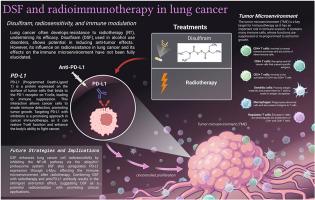双硫仑单独通过NF-κB通路调节肺癌放射敏感性,通过c-Myc靶向PD-L1调节放疗后免疫微环境
IF 3
Q3 ONCOLOGY
引用次数: 0
摘要
肺癌经常对放射治疗(RT)产生耐药性,这削弱了其治疗效果。双硫仑(DSF)是一种通常用于治疗酒精使用障碍的药物,已显示出诱导抗肿瘤作用的潜力。然而,其对肺癌放射耐药的影响及其对肿瘤免疫微环境的影响尚未完全阐明。方法采用致瘤实验、Rad51病灶形成和裸鼠模型研究DSF对肺癌放射敏感性的影响。使用流式细胞术进行免疫分析,并使用RT-qPCR和Western blotting研究下游机制。在C57BL/6小鼠肿瘤模型中进一步验证DSF、RT和抗pd - l1抗体联合治疗的疗效。结果dsf增加肺癌细胞的放射敏感性,增强CD8+ T细胞浸润,并通过c-Myc上调PD-L1表达。DSF、RT和抗pd - l1抗体联合使用的抗肿瘤效果最为显著。结论sdsf能有效减轻肺癌的放射耐药,提高放射免疫治疗的疗效,为改善治疗效果提供了一种有前景的治疗策略。本文章由计算机程序翻译,如有差异,请以英文原文为准。

Disulfiram alone regulates the radiosensitivity of lung cancer through NF-κB pathway and regulates the immune microenvironment after radiotherapy by targeting PD-L1 through c-Myc
Background
Lung cancer often develops resistance to radiotherapy (RT), which undermines its therapeutic efficacy. Disulfiram (DSF), a drug commonly used in the treatment of alcohol use disorders, has shown potential in inducing anti-tumor effects. However, its impact on radioresistance in lung cancer and its effects on the tumor immune microenvironment have not been fully elucidated.
Methods
Clonogenic assays, Rad51 foci formation, and a nude mouse model were employed to assess the impact of DSF on lung cancer radiosensitivity. Immune profiling was conducted using flow cytometry, and downstream mechanisms were investigated using RT-qPCR and Western blotting. The therapeutic effects of the combination of DSF, RT, and anti-PD-L1 antibody were further validated in a C57BL/6 mouse tumor model.
Results
DSF increased radiosensitivity in lung cancer cells, enhanced CD8+ T cell infiltration, and upregulated PD-L1 expression through c-Myc. The combination of DSF, RT, and anti-PD-L1 antibody resulted in the most significant anti-tumor effects.
Conclusions
DSF effectively mitigates radioresistance in lung cancer and enhances the efficacy of radioimmunotherapy, offering a promising therapeutic strategy for improving treatment outcomes.
求助全文
通过发布文献求助,成功后即可免费获取论文全文。
去求助
来源期刊

Advances in cancer biology - metastasis
Cancer Research, Oncology
CiteScore
2.40
自引率
0.00%
发文量
0
审稿时长
103 days
 求助内容:
求助内容: 应助结果提醒方式:
应助结果提醒方式:


